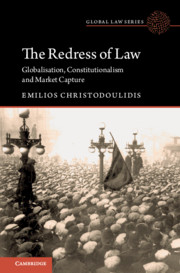Book contents
- Reviews
- The Redress of Law
- Global Law Series
- The Redress of Law
- Copyright page
- Dedication
- Contents
- Acknowledgements
- Introduction
- Part I Political Phenomenology
- 1.1 Hannah Arendt and the Theory of the Bourgeois Public Sphere
- 1.2 Simone Weil: Necessity and Courage
- 1.3 The Phenomenology of Work
- 1.4 Towards a Critical Phenomenology
- Part II Political Constitutionalism
- Part III Market Constitutionalism
- Part IV Strategies of Redress
- Epilogue
- References
- Index
1.1 - Hannah Arendt and the Theory of the Bourgeois Public Sphere
from Part I - Political Phenomenology
Published online by Cambridge University Press: 26 March 2021
- Reviews
- The Redress of Law
- Global Law Series
- The Redress of Law
- Copyright page
- Dedication
- Contents
- Acknowledgements
- Introduction
- Part I Political Phenomenology
- 1.1 Hannah Arendt and the Theory of the Bourgeois Public Sphere
- 1.2 Simone Weil: Necessity and Courage
- 1.3 The Phenomenology of Work
- 1.4 Towards a Critical Phenomenology
- Part II Political Constitutionalism
- Part III Market Constitutionalism
- Part IV Strategies of Redress
- Epilogue
- References
- Index
Summary
In the largely hagiographical literature that surrounds Hannah Arendt’s work, the ‘social weightlessness’ of her account of the political is customarily singled out as at least potentially problematic, the distinction she stubbornly draws between the ‘political and the social’ sometimes taken to be ‘untenable’.1 Such qualifying moves misread Arendt. The distinction is all too tenable and it subtends Arendt’s construction of the public sphere; the ‘social question’ of meeting social needs is introduced by her as a key counterpoint to the conceptualisation of what is properly political. Related, relentless, if less criticised, are the sets of distinctions that organise her account of social praxis, the stark partitions between labour and work on the one hand, and of action as distinguished from both on the other. Importantly, for much of this secondary literature, the first problem can be excised from the body of her thought and set aside without compromising it; in the second case conceptual analysis may be tempered as to the starkness of the dichotomies it deploys. But neither of these qualifications to Arendt’s line of argument take her position seriously. Both gestures are intrinsic to her phenomenological method as constitutive of how Arendt gives meaning to the political. As framing conditions, both ‘moments’ run through the political to the root.
- Type
- Chapter
- Information
- The Redress of LawGlobalisation, Constitutionalism and Market Capture, pp. 17 - 42Publisher: Cambridge University PressPrint publication year: 2021

